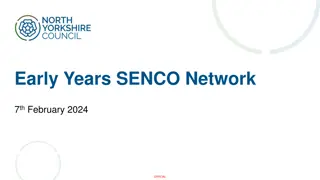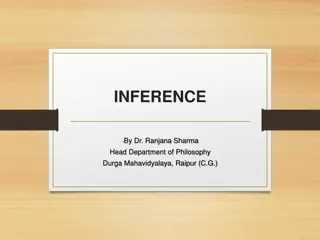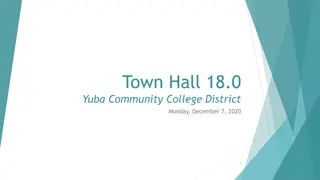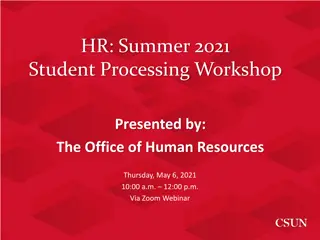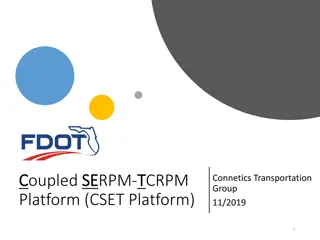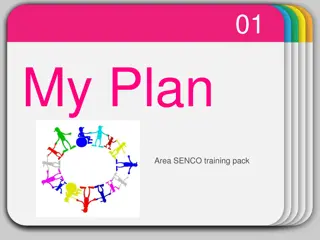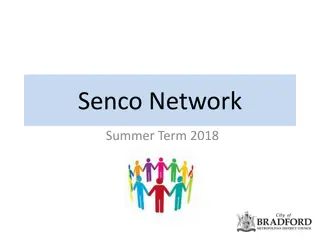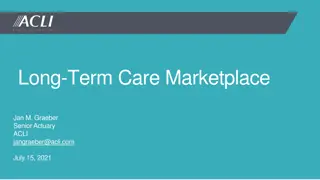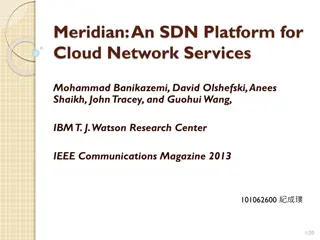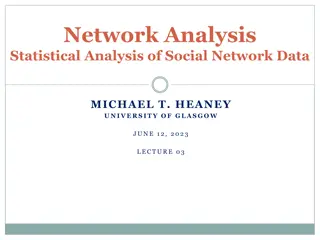Updates and Insights from Senco Network Summer Term 2019
Insights and updates from Senco Network Summer Term 2019 include topics such as EHCP panel updates, EYIF funding, networking sessions, departmental management structures, feedback from panels, decisions on assessment and EHCP issuance, early years SEND inclusion funding, and changes to the current EYIP model in Bradford LA.
Download Presentation

Please find below an Image/Link to download the presentation.
The content on the website is provided AS IS for your information and personal use only. It may not be sold, licensed, or shared on other websites without obtaining consent from the author.If you encounter any issues during the download, it is possible that the publisher has removed the file from their server.
You are allowed to download the files provided on this website for personal or commercial use, subject to the condition that they are used lawfully. All files are the property of their respective owners.
The content on the website is provided AS IS for your information and personal use only. It may not be sold, licensed, or shared on other websites without obtaining consent from the author.
E N D
Presentation Transcript
Senco Network Summer Term 2019
Welcome Senco Update - Ruth Dennis EHCP Panel Update - Ruth Dennis EYIF Funding Ronnie Hartley Transport Paul Hart 9.00 9.15 9.30 9.45 Developmental Coordination Disorder Sharon Bowring 10.15 Networking Break 10.45 Bradford Matrix of Need Ruth Dennis 11.15 SEND Compliance Team - Andrew Crabtree / Wendy Fairman
Departmental Management Structure Strategic Director Mark Douglas Deputy Director Marium Haque SEND Assessment and Psychology Niall Devlin SEND Transformation and Compliance Jane Hall Strategy Manager Lynn Donohue
Feedback from Panel Quality of requests is improving settings understand more what they need to do and use correct forms; Most non agreements due to CYP not requiring SEN provision beyond what is normally available. Full paperwork required not always being submitted eg Progress grid / Individual SEN support offer. Levels sometimes missing or just says below ARE this is not helpful; Missing levels make it hard to judge ; Many requests for change of placement being made without annual / interim review; Settings must keep CYP on role whilst discussion is taking place and seek CYP views
Early Years SEND Inclusion Funding May 2019 High Incidence Team 0-25 SEND Inclusive Education Service
Introduction All LAs are required by the DfE to have an Inclusion Fund for 3 & 4 year olds with SEND who are accessing their early education entitlement. Funding is allocated to promote the inclusion of children with SEND within a pre-5 setting. This funding also supports LAs to undertake their responsibilities to strategically commission SEND services as required under the Children and Families Act 2014. Bradford LA currently: Allocates Inclusion Funding via the Early Years Inclusion Panel (EYIP) to support eligible 3 & 4 year olds in Private, Voluntary and Independent (PVI) settings. Also offers EYIP funding to eligible 2 year olds in PVI settings and 2 year old provisions in schools, and will continue to do so in 2019/20, but this is non-statutory.
Changes to the current EYIP model In November 2018 Bradford LA undertook a consultation on a new holistic model for allocating Inclusion Funding to PVI settings and schools. Following this consultation Schools Forum met in January 2019 and agreed to fund the implementation of the proposed new holistic Early Years SEND Inclusion Funding model. From April 2019: Bradford LA will cease allocating funding via the current EYIP allocation model and will move to a new model for allocating Early Years SEND Inclusion Funding (EYIF). There will be a process to transition children who are currently funded by EYIP to the new EYIF model. Access to EYIF will be extended to eligible 3 and 4 year olds in schools via a pilot scheme, with the aim of rolling this out to all schools from September 2019.
The new EYIF model The allocation of EYIF will be via monthly panel meetings. Providers will be required to submit an application form to access EYIF for a named child. A panel of representatives will consider the applications. Providers will be notified of the outcome following each panel meeting. EYIF will be targeted at children with emerging SEND and who do not have an Education Health and Care Plan (EHCP). At the point an EHCP is put in place resources allocated via this EHCP will replace EYIF.
The EYIF decision making process The panel will review each application and consider: 1. Whether the application meets the eligibility criteria. 2. The number of hours to be funded (%) based on the child s individual needs. 3. The number of weeks/terms to be funded. 4. The amount of funding to be allocated.
1. Eligibility criteria The provider must be registered with Ofsted on either the Early Years Register or must be legally exempt from this registration (schools). The child must be accessing either; their 2 year early education entitlement (up to a maximum of 15 hours) or their 3 & 4 year early education entitlement (up to a maximum of 30 hours). EYIF is not available for children accessing paid for childcare. The child does not have an Education, Health and Care Plan. The child is not accessing a place in an Early Years Enhanced Specialist Provision (EYESP) or a special school (as these places are already funded at a higher level).
1. Eligibility criteria - continued There is evidence that a graduated approach has taken place at SEN support: Assess - The needs of the child have been appropriately assessed. Plan/Do - Details of interventions and support that have already been put in place, including any reasonable adjustments to meet the individual needs of the child. Review The involvement of parents/carers in reviewing the effectiveness of support and the impact that this has had on the child s progress.
1. Eligibility criteria - continued There is evidence that: Referrals have been made to services in health, education and/or social care, as appropriate e.g. EA1 notification, Early Help, Speech and Language therapy, paediatric assessment. Advice received from other professionals has been implemented. Providers are working in partnership with parents/carers and other professionals to; monitor progress, identify next steps and determine an appropriate pathway.
2. Number of hours to be funded The provider will indicate how many hours of early education entitlement the child is accessing in that provision. The provider will indicate how many hours of funding is being requested. The panel will use the Early Years SEN Progress Grid to determine how many hours will be funded (%).
3. The number of weeks/terms to be funded. Assumption that weekly entitlement is delivered over 38 weeks per year (TTO) or stretched all year round, if indicated. Funding would typically be allocated for 1,2 or 3 terms and would be reviewed at least annually. This would be determined by; the age of the child; level of need and timescale for transition to school. Funding would cease when the child leaves a provider or where an EHCP is put in place.
4. EYIF funding model EYIF is based on the equivalent of Element 2 funding for children with emerging SEND, which sets the EYIF unit cost at 6.32. 6000/25hrs (1FTE) /38 weeks = 6.32
Examples of funding Child A attends 15 hrs pw, over 38 weeks (TTO) and 50% funding is allocated 15hrs x 50% x 38wks x 6.32 = 1801.20 per year Child B attends 30hrs pw, over 38 weeks (TTO) and 60% funding is allocated 30hrs x 60% x 38wks x 6.32 = 4322.88 per year
Evaluation of EYIF In July 2019 there will be an evaluation of: The new EYIF funding rate. The pilot undertaken with schools. The EYIF process and application form.
Timescale for implementation 2019 April Transition of PVI settings to EYIF model Roll out of pilot to 3 & 4 yr olds in schools Evaluation of new funding model Evaluation of pilot to schools Roll out of EYIF to all schools July Sept
Post 16 Travel Assistance Paul Hart Post-16 transport and travel support to education and training Statutory guidance for local authorities January 2019 Google - Post 16 transport guidance 34. Young people with an EHC plan will have an institution named in their plan at Section I. There is no entitlement to transport to and from this named provider and transport should only be named in an EHC plan in exceptional circumstances. Local authorities should ensure during EHC plan discussions that parents are made aware that transport support will be considered in accordance with the local authority s own post-16 transport policy. City of Bradford Metropolitan District Council Post-16 Transport Policy Statement Policies and application forms Google - school travel assistance Bradford
DCD (Developmental Coordination Disorder) DEFINITION, ASSESSMENT AND INTERVENTION REBECCA SHUTTLEWORTH PAEDIATRIC OCCUPATIONAL THERAPIST
What is DCD? DCD; acquiring and execution of coordinated motor skills is far below expected level given age, given opportunity for skill learning motor skills difficulties significantly interfere with ADL (activities of daily living) and impact academic/school productivity, prevocational and vocational activities, leisure and play,
Onset is in the early developmental period Motor skill difficulties are not better explained by intellectual delay, visual impairment or other neurological conditions that affect movement https://www.canchild.ca/en/diagnoses/developmental-coordination- disorder
Dyspraxia Not a condition that can be diagnosed medically using DSM-5 Broader definition than DCD and includes various non motor difficulties; planning, organising and sequencing (Dyspraxia Foundation, 2019) Not a recommended term
How is DCD diagnosed? We follow the EACD (European Academy of Childhood Disability, 2010) recommendations to use criteria I-IV which closely follows the DSM-5; The process starts with the paediatrician gathering a history to check symptoms are onset in childhood and to consider the difficulties identified in terms of the age and context of the child (IV) Paediatrician will complete any further assessments needed that may have been indicated from the history to rule out any other medical problems which maybe causing the motor problems. Motor skills deficits are not better accounted for by any other medical, neurodevelopmental, psychological, social condition or cultural background(III)
The OT will complete an assessment to look at the impact of motor difficulties on the child s function. The motor skills deficit described in criterion I significantly and persistently interferes with the activity of everyday living appropriate to chronological age(II) A MABC-2 (Movement Assessment Battery 2) is completed at the child development centre to quantify the motor impairment. Carried out by OT/ and physiotherapist the acquisition and execution of coordinated motor skills is substantially below expected (I)
MABC-2 Scoring Traffic light system used: Red- below the 5th percentile Amber- between 5th and 15th Green 15th and above
What will a pupil with DCD look like? Difficulty participating in playground or PE activities; hopping, jumping, running, catching and kicking a ball Difficulty walking up and down stairs Drawings more scribbled and childish than peers Poor pencil control Difficulty using scissors Trouble getting dressed; slower than peers or difficulty with fasteners Thinking and talking are usually unaffected A clumsy child does not necessarily have DCD. They can have normal motor skills for their age and function well
Handwriting and keyboarding Not assessed within the MABC-2, as the focus is on motor control of the pencil so require a separate assessment Known to be usually affected in children with DCD However handwriting is not just a motor skill, it is a complex process; trunk, shoulder and wrist stability, shaping, sizing, spacing of the letters and then developing a writing style
What can you do for a pupil in Foundation Stage with motor difficulties? Dough disco Introduce tradition playground games with an adult modelling the skills in small groups The Jungle Journey. A whole- class programme to develop fine and gross motor skills. LDA. However if there is no progress after 1 term it is recommended that you target the task that the pupil is having difficulty with using M.A.T.C.H (http://elearning.canchild.ca.dcd_workshop/match. html)
M.A.T.C.H M: Modify the task just right challenge A: Alter your expectations what is the goal of the activity set? T: Teach strategies help to problem solve rather then telling how to do the task C: Change the environment H: Help by understanding the pupil
Bradford Matrix of Need Provides clarity on Graduated Approach and Best Endeavours through: Identification and Assessment : Tells you how to identify if a CYP has SEND Curriculum Access / Teaching and Learning Strategies: Identifies reasonable expectation about what should be in place for CYP with that type / level of need Funding / Placement / Support levels: Indicates LA / school responsibilities, likely placement and suggested support levels. Moves away from describing children as Ranges and towards using qualitative descriptors. Separate guidance for each of areas of COP, with some sub division eg SpLD Colour coded to match Progress Grids Identifies children likely to require EHCP, but funding band decided on basis of EHC assessment Identifies children likely to require specialist placement but funding band decided on basis of EHC assessment Identification and Assessment Funding, Placement and Support Levels COP Stage Curriculum Access, Teaching and Learning Strategies School Support School Support School Support EHCP Mainstream EHCP Special
The best endeavours duty If a registered pupil or a student at a school or other institution has special educational needs, the appropriate authority must use its best endeavours to secure that the special educational provision called for by the pupil s or student s special educational needs is made. (Section 66 of the Children and Families Act 2014) These duties apply to all children with SEN whether they have an EHCP, or not. This means that the governing body, proprietor or management committee must use their best endeavours to secure the special educational provision. Using best endeavours means doing everything they can to meet the child or young person s SEN. It is a proactive duty that requires the appropriate authority to enquire and ensure that the nursery, school or college is actually making the special educational provision that children and young people require. It is not enough to accept the word of a school s head teacher, for example, that an adequate record keeping process is in place the school governors should ensure that it is. The best endeavours duty can require schools or other settings to obtain specialist help, such as speech and language therapists or educational psychologists. The Code also includes a requirement that where a pupil continues to make less than expected progress, despite evidence based support and interventions that are matched to the pupil s area of need, the school should consider involving specialists, including those secured by the school itself or from outside agencies (paragraph 6.58 for schools, or 5.48 for early years settings). For children or young people with an EHC plan, the best endeavours duty also applies, but additionally the local authority ( LA ) has an absolute duty to secure the provision in their EHCP. It is not enough for the LA to simply try their best to provide it: the LA must ensure that it is provided.
Training on Best Endeavours and School Support Strategies The EPT will be delivering fully subsidised training in the autumn term on: Evidence Based Practice for Children with Attention Deficit and Hyperactivity Disorder Evidence Based Practice for Children with Learning Difficulties Evidence Based Practice for Children with Social Communication Difficulties Evidence Based Practice for Children with Social, Emotional and Mental Health Needs Evidence Based Practice for Children with Specific Learning Difficulties Evidence Based Practice for Ensuring Language Access in the Classroom Full programme plus training times / dates will be advertised after half term and you will be able to book your place via Skills4Bradford
Skills4Bradford www.skills4bradford.co.uk Create school account; Use to book onto courses / purchase additional EP time etc.
EP Early Help Hub Consultations Early Help hub sessions enable schools to access support and advice from an EP in a timely and efficient way. Early Help hub sessions are available across the year at a number of locality and central locations. EP Early Help hub sessions are fully subsidised How to Book a Consultation A full timetable of Educational Psychology Early Help hub sessions is available on Bradford Schools Online, https://bso.bradford.gov.uk/content/educational-psychology Please call 01274 439444 to book a consultation From September, book via S4B
Feedback Exercise Look at the section of the guidance on your table and answer the following questions: Will the guidance help you to identify CYPs SEN? Will it help you to know what should be put in place for them? Will it help clarify what is school s / LA s responsibility / contribution? Any further suggestions? Swap with next table until you have done at least 3 sheets General Feedback? 1. 2. 3. 4.
SEND Transformation & Compliance Andy Crabtree & Wendy Fairman
The SEND Local Area Inspection Andy Crabtree T&C Lead
The Inspection The Children & Families Act 2014 through the Code of Practice Places responsibility on local area LA, health commissioners and providers To identify and meet needs of CYP who have Special Educational Needs or Disabilities aged 0-25yrs Minister Edward Timpson commissioned the joint inspection of all 152 LAs Over a 5yr period- starting in May 2016 ending in May 2021 To evaluate how local area -LAs, health commissioners and providers are fulfilling their duties Team includes: Care Quality Commission Inspector HMI Lead Inspector Ofsted Inspector
Inspectors will.. Assess how well local area prepares CYP to live independently And how well local area helps CYP secure meaningful employment as they move into adult lives Hold local area leaders to account for implementation of the CoP and the 3 evaluative questions: Are the needs of CYP with SEND being identified ? Are the needs of the CYP with SEND being met ? Are the outcomes for CYP being improved ?
Collate Information During first 5 days prior to coming on site, the inspectors will review range of information including: National data LG Inform, Capita 1, SEN2 Data Set, SEN Reports Local Offer Website, school/provider websites SEN Report DfE Local Area Information Analyse School Performance replaced Raise on Line Webinars with parents/carers This will help to steer the direction of the inspection and key lines of enquiry
Inspectors will also. Meet with leaders of early years settings, schools and colleges and specialist services Meet with elected members & key local officers from education health, and social care Visit settings and services to look at their understanding of and participation in meeting the areas responsibilities impact on outcomes for CYP Review a sample of CYP files to inform inspection findings Request additional information and data throughout the inspection
SENDCO Specific Wendy Fairman T&C Co-ordinator
Preparation SENDCOs Ensure your website is compliant SEND Policy, annual SEND report, link to Local Offer, Accessibility Plan, Equality Policy, Supporting Pupils at School with Medical Conditions Ensure all relevant policies are in place and are being followed e.g. Supporting Children with Medical Conditions, Transitions Arrangements etc. Pupil SEND files are they up to date and in good order ? Are all staff across school aware of the additional needs of your children ? Children with medical needs should have Individual Health Plans written by school in conjunction with school nurse ? Are staff aware of them ? Does your SEND governor have a good over view of SEND in your school ? Attendance data for SEND pupils can be analysed coding , for off-rolling , exclusion data Familiarise yourself with Local Area Inspection Info Inspectors will select a CYP and follow their story from start to end using pupil files
Attendance Off-site Placements and Part-timetables for EHCP students have to be agreed with LA Do not be creative with coding and provision follow national and local LA guidance Advise the correct code for registers Remember rules for AP registering as Independent Schools Attendance certificates must be attached to annual review docs
Re-Organisation SEND Team Re-allocation of all cases- 0-25yrs Team Six Teams no longer by area Meet the Six Teams on LO Specific Contact Details for Each Team New central E mail addresses for submission of Info etc. Paper Free Systems
E Mail Addresses sen@bradford.gov.uk sendassessrequest@bradford.gov.uk sendannualreview@bradford.gov.uk sendhealthadvice@bradford.gov.


